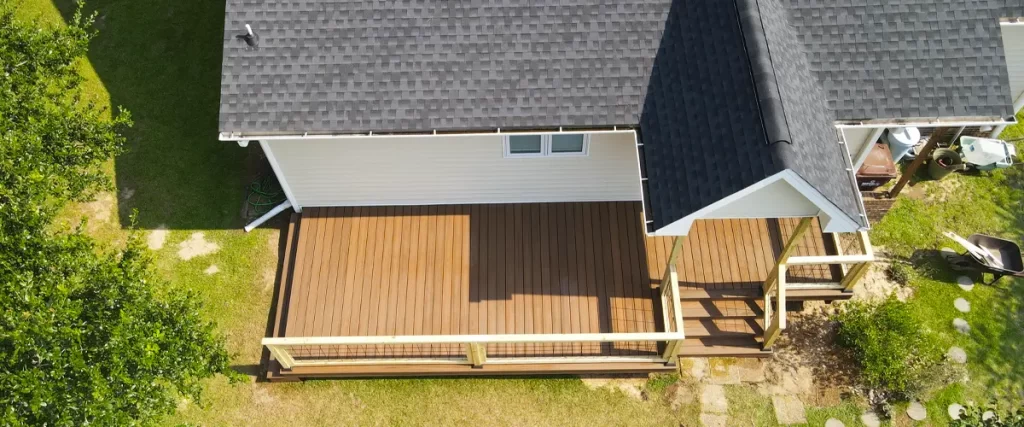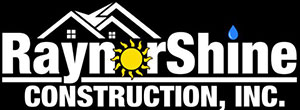Let’s be honest—if you’ve spent even one summer in Fuquay-Varina or Holly Springs, you already know how tough the North Carolina humidity can be. The heat is one thing, but it’s the moisture that sneaks into every crack, corner, and crevice of your outdoor space. And when it comes to decks?
That moisture can mean warping, rot, mold, and a whole lot of maintenance if you’re not careful about the materials you choose.
Here’s the deal: not all decking materials are built to survive the long, humid summers and fluctuating temperatures we get in Wake County. So if you’re planning a new deck or replacing an old one in 2025, this article is here to help you choose something that’s built to last.
We’re diving deep into the best deck materials for North Carolina’s humid climate—with a focus on what works right here in Fuquay-Varina and Holly Springs. We’ll cover the pros and cons of each option, local considerations, and tips for making the most of your investment.

Why Humidity Matters When Choosing Deck Materials
Before we talk boards and beams, let’s talk about why this matters so much in our part of North Carolina.
Our Local Climate in Wake County
Fuquay-Varina and Holly Springs both sit in the heart of the Piedmont region, which means:
- Hot, humid summers with regular afternoon thunderstorms.
- Mild but wet winters—so your deck doesn’t get a break from moisture.
- Lots of shade from trees in many neighborhoods, which can trap humidity and limit airflow.
All of this adds up to one thing: moisture management is key. And some materials handle that better than others.
The Best Deck Materials for North Carolina’s Humid Climate
Let’s break down the top decking materials that homeowners in Fuquay-Varina and Holly Springs should be considering in 2025.
1. Composite Decking (Capped or Fully Encapsulated)
This is one of the most popular choices in the area right now, and for good reason.
Pros:
- Resists mold, mildew, and rot.
- Doesn’t splinter, warp, or crack.
- Low-maintenance—just a rinse and occasional scrub.
Cons:
- Can cost more upfront than pressure-treated wood.
- Some brands retain heat more than others—important for sunny decks.
Best for: Homeowners who want long-term durability with minimal maintenance.
2. Pressure-Treated Southern Yellow Pine
A longtime favorite in the South, pressure-treated pine is cost-effective and readily available.
Pros:
- Affordable.
- Easy to find locally.
- Takes stain and paint well.
Cons:
- Requires annual maintenance in humid climates.
- Can warp or splinter if not sealed properly.
Best for: Budget-conscious homeowners who don’t mind routine upkeep.

3. PVC Decking (100% Plastic)
PVC is a high-performance, fully synthetic material that thrives in humid environments.
Pros:
- 100% moisture-resistant.
- Won’t rot, swell, or mold—ever.
- Very low maintenance.
Cons:
- Pricier than wood.
- Can look a little less natural, depending on the brand.
Best for: Shady yards or areas with minimal airflow where mold might be a concern.
4. Hardwoods (Ipe, Cumaru, or Mahogany)
If you’re going for luxury and natural beauty, tropical hardwoods are tough to beat.
Pros:
- Naturally resistant to rot, insects, and mold.
- Stunning appearance.
- Long lifespan if maintained.
Cons:
- Expensive.
- Requires regular sealing to handle NC humidity.
- Not as eco-friendly.
Best for: Homeowners seeking a high-end aesthetic and willing to maintain it.

5. Thermally Modified Wood
A rising star in deck design, thermally modified wood is heat-treated to resist moisture and decay—without chemicals.
Pros:
- Eco-friendly.
- Dimensionally stable.
- Natural wood look with better durability.
Cons:
- Higher upfront cost than pressure-treated pine.
- Limited availability locally (though growing fast).
Best for: Sustainability-conscious homeowners who want real wood without the downsides.
How to Choose the Right Decking for Your Fuquay-Varina or Holly Springs Hom
Let’s get personal. The best deck material depends on your home, your yard, and how you plan to use the space.
Ask Yourself:
- Is your deck shaded or in full sun? Shaded decks stay damp longer—go for mold-resistant materials like PVC or composite.
- Do you have trees dropping leaves or sap? Low-maintenance materials will save you time and frustration.
- Do you plan to host outdoor parties or keep it quiet and cozy? PVC and composite options tend to feel smoother and more comfortable barefoot.
- Do you love a natural look? Consider hardwood or thermally modified wood—but prepare to seal it annually.
- Do you want to minimize upkeep? Capped composite and PVC are your best bets.
Deck Maintenance Tips for Humid Climates
Even the best material still needs some love. Here’s how to keep your deck looking good in North Carolina humidity:
- Sweep regularly to prevent debris buildup.
- Wash seasonally with a mild deck cleaner to remove pollen and mildew.
- Trim nearby trees to improve air circulation.
- Check for pooling water or sagging boards after heavy storms.
- Re-seal natural wood annually (at minimum).

Best Decking Material Brands for Long-Lasting Performance
These decking manufacturers offer reliable, well-reviewed products that perform well in humid and hot Southern conditions.
- Trex – Known for durable, low-maintenance composite decking that handles humidity and sun exposure with ease.
- Fiberon – Composite and PVC decking with high moisture resistance and a wide range of colors.
- AZEK – 100% PVC decking that’s ultra-durable, fade-resistant, and mold-proof.
- Deckorators – Offers mineral-based composite decking with enhanced strength and moisture tolerance.
- MoistureShield – Their Solid Core composite boards are ideal for ground contact and high humidity.
- Thermory – Industry leader in thermally modified wood, offering a natural look with advanced durability.
- Iron Woods – Supplier of Ipe and tropical hardwoods; known for premium quality and long-term performance.
- Wolf Decking – Offers both PVC and composite options designed specifically for East Coast climates.
- DuraLife – Composite decking with capped technology for maximum protection from moisture and UV damage.
- TimberTown – Distributor of sustainable hardwoods and exotic decking materials perfect for North Carolina homes.
FAQ: Deck Materials & Humid Climate Concerns
What is the most low-maintenance decking material for North Carolina?
Capped composite or PVC decking is the best low-maintenance choice for humid environments like Fuquay-Varina and Holly Springs.
Can I use regular wood for my deck?
Yes, but untreated wood will not last long in NC humidity. Pressure-treated pine or hardwood is better—but both require upkeep.
How long do composite decks last in North Carolina?
With proper installation and basic cleaning, composite decks can last 25–30+ years, even in humid conditions.
Are permits required for new decks in Fuquay-Varina or Holly Springs?
Yes. You’ll need a permit through your local planning department. Start with Fuquay-Varina’s Building Inspections or Holly Springs Planning & Zoning.

Final Thoughts: Build Smarter, Not Harder
Choosing the right deck material isn’t just about how it looks—it’s about how it performs in your climate. In places like Fuquay-Varina and Holly Springs, where humidity is practically a second season, making the right choice now means saving time, money, and stress later.
Whether you’re sipping sweet tea in the shade or hosting a backyard BBQ in the sun, your deck should be built for comfort, beauty, and durability.
Ready to Build a Deck That Lasts?
We’d love to help you plan the perfect deck for your lifestyle and the North Carolina weather. Contact us at (910) 985-8064—we’ll walk you through the best options, materials, and solutions for your home. Let’s build something beautiful and built to last.
